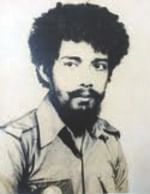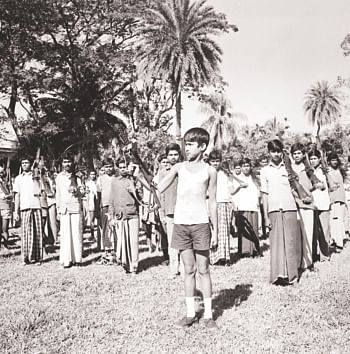| Home - Back Issues - The Team - Contact Us |
 |
| Volume 11 |Issue 49| December 14, 2012 | |
|
|
Achievement Bir Protik Mahbubur Rob Sadi A FEARLESS FREEDOM FIGHTER Tulip Chowhdury
Like many accounts of historical lives, our freedom fighters may one day live only in the pages of history. Those who have survived through the bloody war will have to leave their beloved land when that inevitable last breath comes. Many of the freedom fighters are still with us, some physically or mentally maimed, some living in poverty and hardships and some have found peace and rewards. They are the invaluable living witnesses to the genocide and horrors of our freedom war. Though many of them have been brought to light but there are some who have fought the war, taken challenges beyond imaginations and yet remain hidden away from the present generation who will be leading the nation in the future. One such freedom fighter is Mahbubur Rob Sadi, born on 10th May, 1942 in Sylhet. The war he fought forty-two years back still haunts his mind. The bloodshed, the deaths, rapes and tortures are still like living nightmares. But he knows the fight was worth every breath of his life, for now we walk on the soil of our independent Bangladesh as proud citizens of the nation. Mahbubur Rob Sadi was a Sub-sector Commander in Sector-4, in Sylhet during the war of liberation. When the struggle for independence began he was on his way to Khawai subdivision in Tripura for training under the BSF. Completing his training there he was once again off to train under the army in Meghalaya. Struck by Sadi's fearlessness and bravery the Indian Brigadier Watke called him to an interview and asked him to join the armed forces. Sadi declined saying that he was there to fight for the freedom of his motherland, not a position in the armed forces. The Brigadier said, “I will give you one rifle to kill one enemy, but don't you want anything?” Sadi replied, “Give me more rifles and I will kill more enemies!” From this day I am posting you as a sub-commander in Sector-4 in Sylhet” was the Brigadier's reply. All through the freedom war Sadi was fighting along with other freedom fighters under Commander C. R. Datta. In the guerrilla warfare when a raid was made a sepoy was sent to the task of silencing the sentry of the enemy camp for it is more important for the commander to be safe and be in a position to lead. In one of these raids Sadi, the Sub-sector Commander himself went to silence the sentry to save the other fighters for many of them were newcomers and were not trained for the attack. But the sentry saw Sadi and fired. The bullet missed the shot and was hit the torch which Sadi held out in his outstretched right hand, a tactic he had learned from a policeman. The other fighters followed and the operation that day was successful as they wiped out the enemy camp. In another incident, Sadi was shot at by the enemy. Sadi had remarkable curly thick hair that stood up like a six-inch tall hat. Sadi thought that his head was hit but soon found that the bullet had missed his scalp and was stuck in his mass of thick curly hair. He fought with a clear conscience, a firm belief that injustice and the reign of terror let loose by the Pakistani army had to come to end even if that meant the end of his life at the next moment. Immediately after liberation, law and order had to be restored as looting and plundering took to the streets. At that time Sadi was made the honorary commander of Shanti Rakhi Bahini in Sylhet by the government for maintaining peace. Under his leadership Sylhet was well known as the district where the looting and plundering was soon under control.
Mahbubur Rob Sadi was a very courageous and generous person right from his early years. He was never scared of hidden dangers. The unknown was always a challenge to him. His village Bongaon was a hilly area and was surrounded by dense jungles. Mountains of the Indian border of Tripura were close to the village and wild animals from the mountains roamed the jungles. Wild cats, foxes, porcupines, elephants, wild pigs (buno- shuor) and snakes were everyday sights. On nights one could even hear the tigers roaring away as they descended to the villages in search of food. The villagers often became victims of these wild animals and the person called for rescue was “Sadi Shaheb”. He was always ready with his gun and was a sharp shooter. He was the good samaritan for all the people. He would be beside the sick and take them to the doctors. His father, Late Dewan Md. Mamoon Chowdhury was always worried about news of his son selling off trees or land to help someone. He was like a banyan tree under which people always took shelter from the sun or rain. Sadi is always loved by his vast circle of friends and well wishers for his empathy and generosity. Deep inside the kind heart was also rebel that did not hesitate to rise against injustice in 1971.His father, Late Dewan Md. Mamoon Chowdhury was a strong supporter of a liberated Bangladesh. Therefore, he was in agreement with Sadi when his son wanted to join the liberation forces. Sadi left behind his parents and beloved younger sister knowing that he may never return again. In the meantime Late Dewan Md. Mamoon Chowdhury was taken by the Pakistani soldiers for interrogation as they learned of his freedom fighter son. But the father genuinely had no idea of the where about of his son and after torturing him for three days mercifully he was freed. Mahbubur Rob Sadi also has a writer, musician and a politician hidden inside the brave heart that took him to people through rain or storms. He authored a poetry collection called Baro Bhaja published by Shishu Academy. Writing runs in his blood for he is the nephew of the well known writer Syed Mujtaba Ali. He was a radio artist as well. He was an active member of Chatra League in his college life. He joined the leftist party JSD after liberation and became a Member of Parliament in the late seventies. Many were the times when he was called by the running governments to take up prestigious portfolios. But he was not the one to take advantage of his recognition as a valiant freedom fighter. He was awarded the gallantry award “Bir Protik.” But he refused to take the medal. All the gallantry awards of “ Bir Shrestro” were given to the armed forces. It was Sadi's firm belief that many civilian martyrs also deserved the “Bir Shresto” award and therefore in protest he did not collect his own medal. His question is that the civilian martyrs who had taken up arms at a moment's notice, left orphans and widows behind; were none of them worthy of the “Bir Shresto” award? The father of three lively children, he now leads a life that is seeing the setting rays and yet in his heart the brilliance of the rising sun keeps him awake to life. He lives a simple life and lives in a rented house. Even at this age, Sadi strums with his endless kindness and not a soul will return empty handed no matter what kind of help he or she might need. His richness lies in his heart not wealth.Though he is fighting another war as his wife suffers from cancer, he goes on encouraging her to have belief in the Almighty, to hold on to life. To him it is the courage of the soul that keeps life going. He lives faraway from mainstream politics for the divide in ideologies but has a small organisation called Gonotontro Onushilon Kendro. He often sits reading or writing about life and asks us, “Have we yet achieved the full benefits of becoming an independent nation? We have made much progress as a developing country. But the political turmoil, the corruptions, sufferings of the masses as inflation hits hard even forty-two years after the bloody war we fought; is this the freedom for which we had sacrificed so much?” Copyright
(R) thedailystar.net 2012 |

